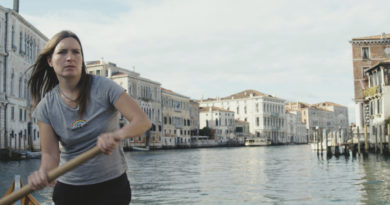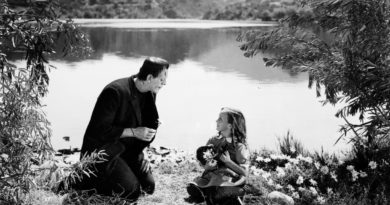Január 2: A Deep Dive into the Emotional Landscape of Separation
Január 2, directed by Zsófia Szilágyi, premiered in the Biennale College section at Venice 81. The film captures the raw emotions and complexities of a family separation, viewed from the perspective of a third party. The narrative unfolds the day after New Year’s Day in a desolate but enchanting Budapest.
The story follows Ági as she drives through the city in the early morning, passing through empty streets to arrive at the outskirts, where she meets her friend Klára, who is a young painter or at least someone passionate about painting, living in a house with a courtyard, children’s toys, and a swing. The atmosphere inside is tense. Klára’s mother is preparing to take the children to her home outside the city, amid a clutter of boxes and bags like those found in any Chinese variety store in Europe. Klára’s husband is grim and barely speaks. Their two children, a boy around seven or eight years old and a little girl perhaps three, are visibly confused. The boy looks down, keeping his emotions inside, while the girl tries to be playful but realizes the painful reality of her parents’ separation as her grandmother prepares to take her away.
The narrative unfolds as Klára navigates her way through a painful separation, aided by Ági. Klára tries to find order in the physical chaos around her, symbolizing her internal struggle to come to terms with her new reality. The film’s emotional core is deeply rooted in these everyday, mundane moments, making it a powerful reflection on the complexities of family dynamics and personal crises.
Through multiple car trips filled with boxes and belongings, the film introduces us to the people closest to the struggling couple: Klára’s mother and her husband’s parents, with his mother showing a hint of disapproval over Klára’s decision to leave, even though her son has also realized their marriage has no future. His father, more objective and empathetic, remains a stable support for Klára, showing affection and not wanting to sever ties even after the separation. We also meet Klára’s brother and cousin, who manage to lighten the atmosphere by sharing photos from a New Year’s Eve party, revealing they are beloved figures to both Klára and her husband.
During these moves, we also meet Klára’s new boyfriend, a relationship that seems already weary and routine—perhaps just a safety net for Klára to avoid being alone and to find the courage to leave a man to whom she still feels emotionally tied, unable to imagine a future without him despite everything.
Throughout the day, from early morning to late at night, amid many silences and necessary words about where to move the boxes, the dialogues occasionally delve deep, revealing raw emotions. The perspective throughout is Ági’s, who herself is experiencing a relationship crisis. Observing Klára’s situation might help her better understand her own, hopefully without reaching the same conclusion.
Január 2 is a poignant exploration of the emotional landscape that surrounds separation, capturing the mundane yet profound moments that define the end of a relationship. Through Ági’s eyes, the film offers a reflective and introspective look at the nature of human connections, making it a compelling watch for those interested in the intricate dynamics of love and loss.
Január 2 is Zsófia Szilágyi’s second feature. Her debut feature, One Day, premiered in Cannes Critics’ Week in 2018, where it won the Fipresci award.
Film Technical Specifications
International Title: January 2
Original Title: Január 2
Country: Hungary
Sales Agent: Films Boutique
Year: 2024
Genre: Fiction
Directed by: Zsófia Szilágyi
Film Run: 87′
Screenplay: Zsófia Szilágyi
Cast: Csenge Jóvári, Zsuzsanna Konrád, Edit Vlahovics, Kornél Balla, Viola Béres, Márton Pallag, Csaba Antal D., Erika Molnár, Ferenc Borbiczki, László Göndör
Cinematography by: Kristóf Becsey
Film Editing: Attila Csabai
Art Director: Csenge Jóvári
Costumes Designer: Bori Solymosi
Music: Máté Balogh
Producer: Dóra Csernátony
Production: Poste Restante




